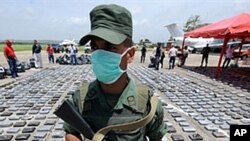U.S. anti-drug officials are calling for greater efforts by Venezuela to combat drug traffickers who are using the country to make illegal shipments. While attending a regional anti-drug conference in Miami, Venezuelan leaders say they are working to crack down on the problem.
U.S. and Latin American officials gathered in Miami to seek new resources to use against the expansion of drug trafficking and drug abuse. The Organization of American States urged the member states should increase cooperation to fight what is increasingly a cross-border problem.
As a major consumer of illegal drugs, the United States has sought to work with Latin American nations to stop production and shipment of cocaine, marijuana and heroin.
U.S. officials say a major obstacle to their efforts in recent years has been the lack of cooperation with Venezuela's government.
David Johnson is assistant secretary of state for international narcotics. He says the chief concern is the number of unauthorized flights from Latin America which are believed to be carrying illegal drugs.
"The bulk of them at this time are exiting Venezuela and the border region with Colombia. If you look at the radar tracks you can only draw the conclusion that that is where the problem lies," said Johnson.
Johnson says Venezuelan police have the capacity to do more to stem illegal flights.
Anti-drug cooperation between the United States and Venezuela has suffered since 2005, when President Hugo Chavez ordered U.S. drug agents to leave the country. Mr. Chavez claimed some agents were conducting political activities against his government, but Washington denies this.
Deputy director of Venezuela's drug agency, Edylberto Molina says the government has struggled with transshipment of drugs produced in Colombia or elsewhere. But he says new police efforts are targeting the transit sites.
Molina says security forces have used explosives to destroy 242 illegal runways to prevent criminal groups from using the landing strips again.
Police also have seized 11 airplanes and 1100 kilograms of cocaine in recent operations.
Molina says one of the biggest difficulties is determining whether Venezuelan or Colombian groups are responsible for the illegal flights, because of the porous nature of the border region.
He says almost anyone can use a tractor to flatten a farmer's field during the dry season and enable a small plane to land. He says it is hard to know where the traffickers originated.
Colombia recently signed a deal to open some military bases to U.S. officials to help in the battle against drug traffickers and leftist rebels. Venezuela's President Chavez has criticized the deal for raising fears about a possible military conflict in the region.
OAS officials say the global expansion of drug trafficking also has spread problems of drug addiction around the region. James Mack is executive secretary of the drug abuse control commission for the OAS.
"If a drug passes through a country or is produced in a country, some bleeds off there because not everybody is an international drug smuggler," he said. "Little by little the local population is going to be affected."
Experts say recent studies show cocaine use has risen sharply especially among poor communities in Argentina, Chile and Uruguay. Inhalant use has reached alarming levels in Brazil, Jamaica and other Caribbean nations. And while marijuana use has stabilized in the United States, it is a top reason for Americans to seek treatment for drug abuse.
News
US Hopes to See More Anti-Drug Efforts in Venezuela
update

U.S. and Latin American officials gathered in Miami to seek new resources to use against the expansion of drug trafficking and drug abuse.



